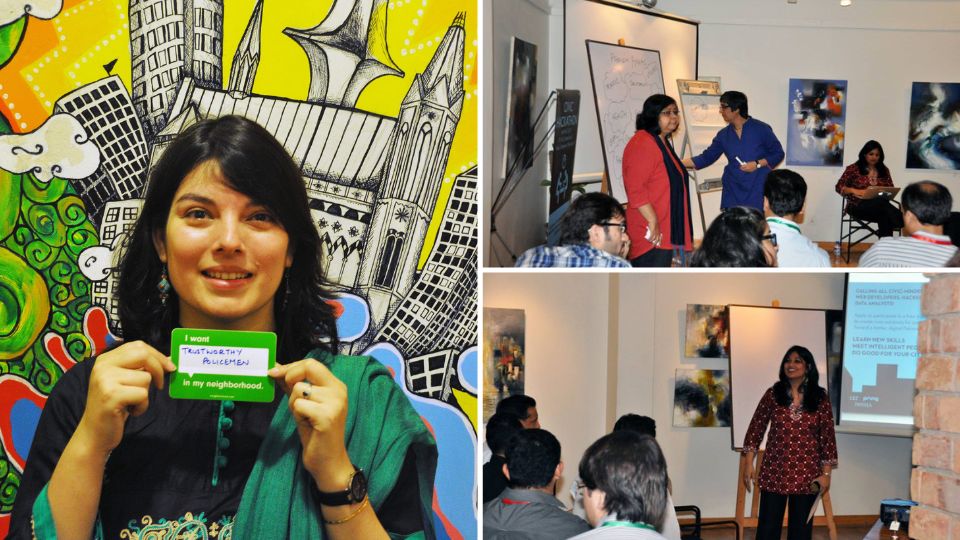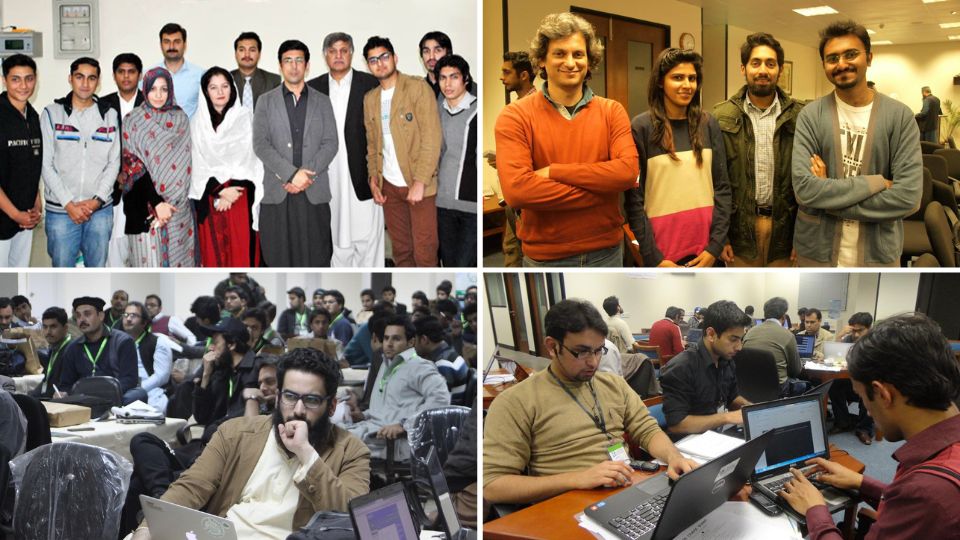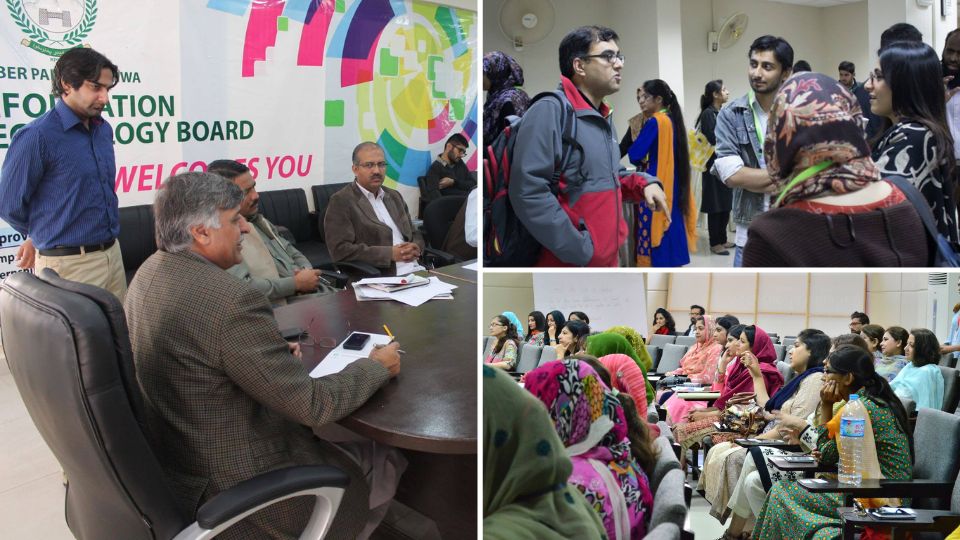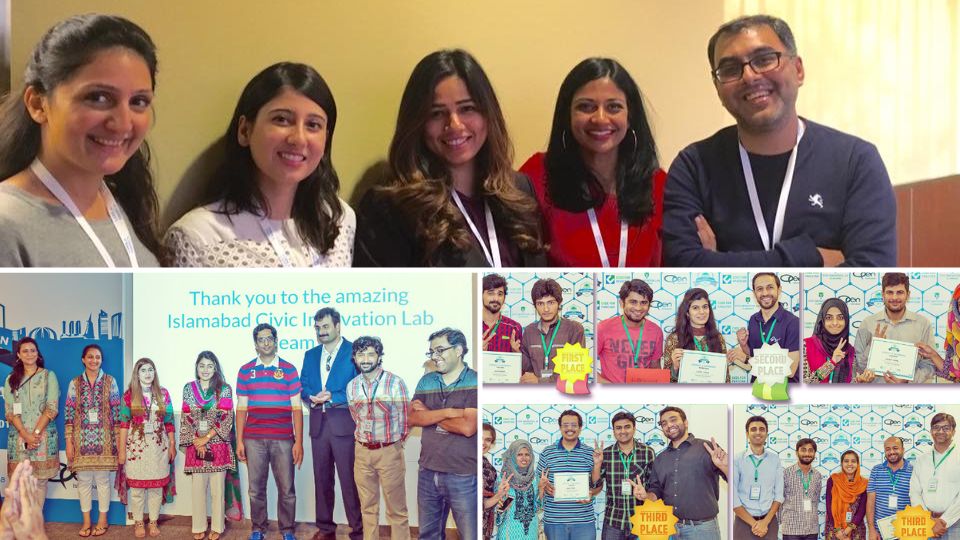— 2013
Pakistan's first civic hackathon
In April 2013, Sheba Najmi held Pakistan’s first-ever Civic Hackathon in Karachi, with support from T2F, P@SHA, and Pring. The event tested the hypothesis that there was interest in civic hacking. Participants included community organizers, animal rights activists, software developers, designers, journalists, government officials, and doctors. With no winners or prizes, the event encouraged collaboration and enthusiasm as participants worked to address common civic challenges.
Based on this success, Code for Pakistan was incorporated as a 501(c)(3) nonprofit under the name Tech for Change.


— 2014
Expanding to Lahore and Peshawar
Civic hackathons were launched in Lahore at LUMS and in Peshawar at UET, engaging hundreds of civic tech enthusiasts. The Lahore hackathon led to the creation of "Savaree," later acquired by Careem.
The first KP Civic Innovation Fellowship began in collaboration with the KP IT Board and the World Bank, welcoming 12 fellows.
Additionally, the first Civic Innovation Lab was established in Lahore, laying the foundation for a volunteer-run network of hubs.
— 2015
Establishing a Presence in Islamabad
The second KP Fellowship cycle began with 20 fellows working on five government projects.
Islamabad hosted Pakistan’s fourth Civic Hackathon at NUST University.
This year also marked the launch of the Islamabad Civic Innovation Lab (CIL), forming a core team that would drive impactful initiatives for years to come.


— 2016
Building momentum
The 5th Civic Hackathon was held in Islamabad, catalyzing the launch of new Civic Innovation Labs in Chaklala and Bahria, further expanding the network.
The Muhafiz app, developed in partnership with Media Matters for Democracy (MMfD), was introduced to enhance journalist safety.
On the global stage, Code for Pakistan participated in the Internet Governance Forum 2016 in Mexico, while our founder represented the organization at The Impact of Civic Technology Conference in Barcelona.
— 2017
Expanding Innovation
The third KP Fellowship cycle addressed diverse civic challenges and launched the Fellowship Alumni Network to connect graduates.
The Raabta app enabled citizens to access real-time traffic information for the KP Traffic Police.
A new CIL opened in Peshawar, providing a hub for civic tech efforts.
Code for Pakistan co-hosted the SDG Hackathon with Ignite and the Ministry of IT & Telecom, aligning technology initiatives with the United Nations’ Sustainable Development Goals (SDGs.


— 2018
Optimizing Systems
The fourth KP Fellowship cycle introduced impactful projects such as the PSRA E-Registration System, which streamlined online registration for 9,000 schools across KP.
A second SDG Hackathon, organized with OPEN and Jazz, continued to address sustainability challenges.
— 2019
Scaling Civic Impact
The fifth KP Fellowship cycle welcomed 17 fellows who worked on seven critical civic challenges.
Code for Pakistan partnered with the World Bank for the Pakistan@100 Innovation Hackathon.
A third SDG Hackathon in Islamabad brought together diverse participants to tackle global issues.


— 2020
Innovating During Crisis
In response to the COVID-19 pandemic, the sixth KP Fellowship cycle transitioned to a remote model, with 20 fellows working virtually.
Code for Pakistan supported the government’s pandemic response through dashboards and telehealth initiatives.
Key achievements included developing the ApnaRozgar Portal in partnership with the Akhter Hameed Khan Resource Center (AHKRC) to assist job seekers, publishing Pakistan’s first Open Data Playbook to promote transparency, and hosting the first online Civic Hackathon, which attracted over 700 applications from six countries.
Additionally, the Peshawar CIL team developed a desktop application to manage point-of-sale and inventory for Mobile-Book-Shops.
— 2021
Broadening Impact
The 6th KP Fellowship cycle concluded, equipping another cohort of fellows with the skills to address critical civic challenges.
The 7th KP Fellowship cycle launched, with nine civic initiatives for seven KP government departments.
The first KP Women Civic Digital Internship was introduced in partnership with the KP IT Board, the World Bank, and Helvetas Swiss Intercooperation, nurturing the next generation of female tech leaders.
Returning to Peshawar, an SDG GovTech Hackathon was held in collaboration with the KP IT Board.
Additionally, the Tech-NIH Fellowship was launched in partnership with NIH Islamabad, supporting six fellows working on five healthcare-focused projects.
Code for Pakistan team members also participated in mySociety’s TICTeC Civic Tech Surgery and Show & Tells, sharing insights and innovations with the global civic tech community.


— 2022
Harnessing Potential
Code for Pakistan celebrated International Women’s Day in partnership with the Ministry of IT & Telecom, the World Bank, the National Information Technology Board, and the KP IT Board, curated by InspireMill.
In response to devastating floods, the team developed FloodLight, a critical tool for relief efforts.
The 14th CfP Alumni Reunion was held at the National Incubation Centre in Peshawar, reflecting on the work and impact of seven fellowship cycles.
The second KP Women Civic Digital Internship engaged 50 interns and 9 mentors, empowering women in civic technology. Additionally, the HCAI App was launched in collaboration with WHO and FMTI-PIMS to monitor and prevent healthcare-associated infections.
— 2023
A Decade of Civic Innovation
The second KP Women Civic Digital Internship concluded with 47 graduates, nearly half of whom secured employment, demonstrating the program’s impact in empowering women in technology.
The Government Innovation Fellowship expanded to Gilgit-Baltistan, extending its reach to new regions, while Pakistan’s first Volunteer Tourism Program was introduced, encouraging civic engagement through immersive experiences.
At National Incubation Center Peshawar (NIC) a Tech Camp equipped young participants with essential digital skills, preparing them for the future of work.
Marking 10 years of civic tech innovation, Code for Pakistan celebrated this milestone with several impactful initiatives.
The 5G Innovation Hackathon explored next-generation technology’s potential across diverse sectors, addressing challenges in health, education, and climate change.
Additionally, Guftugu events were launched in Karachi, Islamabad, and Peshawar, bringing together tech enthusiasts and social innovators to inspire dialogue and drive community-centered change.


— 2024
A Year of Achievements
The year began with Intikhabi Melas, empowering citizens to understand their voter rights and fostering informed electoral participation.
In February, Sheba Najmi was honored with the Hum Women Leaders Award 2024 for her pioneering work in civic tech.
At TICTeC in London and San Diego Design Week, we showcased Pakistan’s civic innovation journey on the global stage, sharing insights and success stories with international audiences.
We launched the 8th cycle of the Government Innovation Fellowship, onboarding 20 fellows to drive impactful projects with government partners.
Citizens gathered in Islamabad for a Town Hall on VPN restrictions, sparking meaningful dialogue on digital rights and accessibility.
Closing the year on a high note, Code for Pakistan received three Special Recognitions at the Don Norman Design Awards, celebrating our efforts in human centered design for social good.